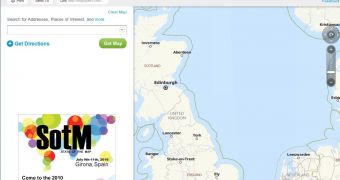AOL’s MapQuest has announced an interesting partnership open-source online mapping outfit OpenStreetMap. Through the partnership, MapQuest will begin using data provided by OpenStreetMap to power a version of its product. This new product, available for now in the UK at open.mapquest.co.uk, will reside separately from the main site and will not use any commercial mapping data.
“Today we launched a version of the newly redesigned MapQuest, but on open data provided by the OpenStreetMap community," Randy Meech, Head of Engineering for AOL Local and Mapping, said.
"Not only is the map data open, but also this beta map stack uses popular open-source mapping software, including Mapnik for tile rendering, TileCache for caching, and Nominatim for geo-coding and search. We are now employing developers to contribute back to these projects for the benefit of the community," he explained.
The new site is now live and accessible to anyone in the world, despite the UK domain name. Open MapQuest resembles the regular site; it uses the same interface and layout, launched very recently. However, it is lacking several features and feels a bit spartan for now.
There is only one view, the simple map view, and you don’t get the place search box or the places buttons that you get on the regular site. This makes sense since OpenStreetMap only provides basic, but thorough, mapping information.
Since OpenStreetMap releases the data under an open license, no money is exchanging hands. However, AOL has pledged $1 million to support open-source mapping in the US. For the company, the main advantage of using this data source is clear, it’s cheaper. Commercial mapping data can be quite expensive and, though the open-source data may not be on par, the savings are significant.
There are other advantages as well, hyper-local data may be more detailed and more accurate than what’s available from commercial outlets since the data is updated by people in that specific area. Road works or other temporary or permanent changes can be updated much faster this way.

 14 DAY TRIAL //
14 DAY TRIAL //